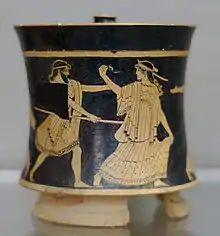Aegina
English

Attic red-figure pyxis showing Zeus chasing Aegina
Etymology
From Ancient Greek Αἴγινα (Aígina).
Pronunciation
- IPA(key): /iˈd͡ʒaɪnə/
Proper noun
Aegina
Derived terms
Translations
Anagrams
Latin
Etymology
Borrowed from Ancient Greek Αἴγινα (Aígina).
Pronunciation
- (Classical) IPA(key): /ae̯ˈɡiː.na/, [äe̯ˈɡiːnä]
- (Ecclesiastical) IPA(key): /eˈd͡ʒi.na/, [eˈd͡ʒiːnä]
Declension
First-declension noun, singular only.
| Case | Singular |
|---|---|
| Nominative | Aegīna |
| Genitive | Aegīnae |
| Dative | Aegīnae |
| Accusative | Aegīnam |
| Ablative | Aegīnā |
| Vocative | Aegīna |
Related terms
- Aegīnensis
- Aegīnēta
References
- “Aegina”, in Charlton T. Lewis and Charles Short (1879) A Latin Dictionary, Oxford: Clarendon Press
- Aegina in Gaffiot, Félix (1934) Dictionnaire illustré latin-français, Hachette
- “Aegina”, in William Smith, editor (1854, 1857) A Dictionary of Greek and Roman Geography, volume 1 & 2, London: Walton and Maberly
This article is issued from Wiktionary. The text is licensed under Creative Commons - Attribution - Sharealike. Additional terms may apply for the media files.